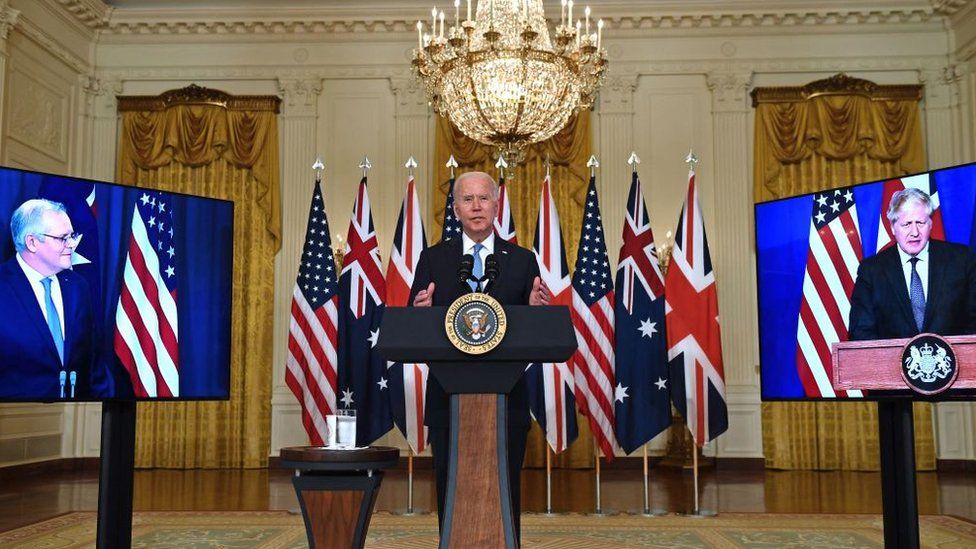BY: Pooya Mirzaei

PEJOURNAL – The leaders of the United States, Britain and Australia signed a diplomatic, security and military co-operation agreement targeting the Indo-Pacific region, that is called AUKUS.
The key point in AUKUS is that Australia’s nuclear submarine program will be the first major project of this pact that will help Australia acquire nuclear submarines.
Although the media and political circles claim that the purpose of AUKUS agreement is to counter China‘s growing influence in the world, a deep look at AUKUS reveals several important points:
First; The agreement focuses on Australia’s acquisition of a nuclear submarine in clear violation of the International Atomic Energy Agency (IAEA) Non-Proliferation Treaty (NPT), which obliges countries to destroy, not to develop, nuclear weapons.
Given that AUKUS pact is a nuclear threat to the world and can turn into unhealthy competition and a dangerous innovation in the world, that IAEA is obliged to hold accountable and confront the perpetrators of AUKUS.
Of course, the IAEA must also answer why it is silent and refuses to address the $ 700 billion US budget to strengthen its military nuclear capability, as well as the official positions of Britain and France on increasing nuclear warheads and nuclear weapons.
Second; The behavior of the United States and Britain in strengthening the non-peaceful nuclear program of Australia that is defined by double standards and based on American interests, is evidence of their policy and fictitious cases for other countries. As against years of peaceful activities regarding Iran’s nuclear rights under the IAEA, the United States is sabotaging and even imposing sanctions and military threats, while in return it is working to strengthen the non-peaceful nuclear power of a country like Australia as well as the Zionist regime.
Third; British-American action paves the way for an arms race in the Pacific and East Asia that will have repercussions around the world. The United States and Britain, which once threatened the security of the world with the creation of al-Qaeda and then ISIS, now seem to be seeking to repeat a new dimension of global crisis by developing nuclear weapons to countries such as Australia, that will threaten the security of the international system. In this case, countering this action is considered essential by the United Nations and international organizations for world security.
Fourth; AUKUS, which has taken a heavy toll on America’s European allies, has been described by French Foreign Minister as a “dagger-on-back” deal with Paris, which cost France $ 90 billion. The EU’s critical statement to the agreement is a clear proof of the legitimacy of countries such as Iran in a position that the United States is unreliable.
The question is how one can trust the commitments and promises of the United States without even adhering to its commitments to its allies, who have always been loyal to it. This behavior is the legitimacy of Iran’s positions, which has made the lifting of sanctions and the verification of this lifting and the written commitment of the Western parties not to return the sanctions and threats, a precondition for returning to the obligations of JCPOA.
In conclusion, it can be said that the United States and Britain, which in 2001 waged the war in Afghanistan, in 2003 in Iraq, and in 2011 created ISIS against world security, are now seeking to plunge the world into a new crisis. They are centered on East Asia and the Pacific, a sedition whose solution is a global consensus to counter their unilateralism.
Given that economic tools have become the most important component of US power and coercion today, non-compliance with US sanctions against other countries and the reduction and elimination of the dollar from the global financial and trade system could be important steps in countering US unilateralism and its security threats. Meanwhile, the IAEA is obliged to deal seriously and comprehensively with the dangerous heresies of the US and UK nuclear powers, in other words, in the context of the prohibition of nuclear weapons instead of politicization and sabotage of the peaceful nuclear rights of countries such as Iran.